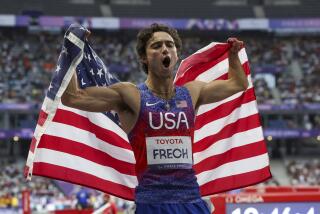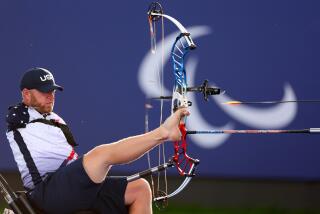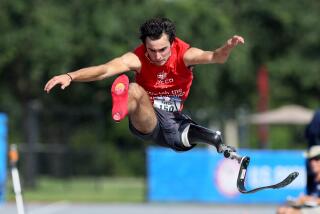Vietnamese youth, veteran of war believe ‘fate brought them together’ to train for Paralympics.
- Share via
A pre-dawn mortar attack in 1969 on the American camp at Tay Ninh, Vietnam, riddled Mike Parson’s lower legs with shrapnel, and eventually cost him his right leg from the knee down.
That same year Rick Hoang was born in Saigon, 60 miles to the southeast.
Two decades later, the two were in the United States training together for the Paralympics in Seoul, Korea.
“Fate brought us together,” said the 19-year-old Hoang, who was a record-breaking sprinter before he lost an arm in a work accident two years ago.
About 3,000 athletes from 60 countries are participating in the games for the handicapped this month, held for the first time in conjunction with the Olympics.
Parson, 43, director of a Mormon institute in Los Angeles and a Temple City resident, contacted Hoang last year after hearing about him from a mutual friend. Parson was training for track and field events in the United States Amputee Athletic Assn. national championships in Nashville, Tenn., and needed someone to pace him. He suggested to Hoang that they train together.
“I probably wouldn’t have started running (again) without (Parson),” Hoang said.
The Temple City High graduate was working in a Laundromat in August, 1986, when he slipped. Groping to break his fall, Hoang inadvertently thrust his arm into a spinning high-speed dryer. His right arm was twisted off above the elbow.
Hoang returned to the track after he was injured, not knowing how it would affect his running. Off-balance because of his missing arm, he fell heavily to the ground as he rounded a curve. He was discouraged by the pain during workouts and soon left the school track team, struggling with thoughts of suicide.
Parson’s letter telling him about the national heats “meant a great deal to me,” Hoang said, musing: “It’s weird that Mike lost his leg close to Saigon, and 17 years later we meet in this country and I’ve lost my arm.”
This May they walked away with eight medals between them, and qualified to represent the United States in the Seoul games that opened Saturday.
Hoang has survived adversity before.
His escape from his homeland took plenty of gold for bribes and five harrowing attempts within three years, including one in which he was shot four times in the legs, he said, showing off the scars. He finally managed to reach Thailand via Cambodia by foot in 1981.
His accident was particularly devastating because of its effect on the family he left behind, Hoang said. “If I’m (handicapped) like this I can’t send medicines (to family) back home,” the recent American citizen remembers thinking after the accident.
“They gave me all the money to let me come here,” Hoang said, describing how his parents gave him gold necklaces to swallow before his final escape attempt so they would not be confiscated if he were caught.
Hoang now works the graveyard shift as a gas station attendant so he can train during the day. He will resume studies at Pasadena City College next spring.
Parson was a cross-country star while growing up in the South Bay and “had no doubt I would be a world-class runner.” He tried to get onto the Army track team when he was drafted in 1968, even writing to his congressman for help, “but they really wanted infantrymen more than runners.”
“I knew something could happen (during the war) and I was frightened, but I was really looking forward to getting it out of the way.”
Something did happen.
After his injury, he despaired of ever running competitively again. But numerous alterations to his artificial leg and a new, more flexible carbon-graphite foot gave him hope, although he must take extra steps that other athletes do not.
To avoid serious blisters, he has to change the sock on his stump three times during an hourlong workout to keep it dry.
“It’s a lot of trouble and hassle,” he admits. “If I want to participate I have to go through this whole routine, but to me it’s still worth it.
Parson, who obtained a law degree this summer, noted it has taken him time to stop comparing his times to how he used to perform.
“They are two totally different worlds. At first it discouraged me but now . . . the fact that I can compete at all is remarkable.”
He will run in the 200-meter and 400-meter races, for which he won bronze and gold medals with 31.9 seconds and 74.3 seconds in the nationals this May.
Parsons said that it is unfortunate that while the Olympics receive a great deal of media attention, the Paralympics do not.
“It’s understandable that people would be more interested in able-bodied athletes,” Parson said. But he said he hopes more will watch the games this year. “I think they’d be very surprised and inspired. It’s not like we’re all limping around the track.”
Unlike their counterparts in the regular games, Paralympians have to find their own sponsors.
Although the United States Organization for Disabled Athletes gave each athlete $1,500, participants had to raise the remaining $3,500 needed for the trip.
“We won’t eat afterwards, but we’ll get to go to the Olympics,” quipped Parson, who like Hoang will continue paying off travel costs after returning from the games.
Hoang, who says he runs strictly for fun, said he will be happy “as long as I don’t embarrass myself” by failing to win at least a bronze for each race. Competing in five events in Seoul, he aims to reduce his qualifying 11.6 seconds for his favorite, the 100-meter dash, to his pre-injury best of 11.1 seconds.
Neither plans to quit running after the Olympic glow fades.
As Parson says: “There’s still Barcelona (Spain) in four years.”
More to Read
Go beyond the scoreboard
Get the latest on L.A.'s teams in the daily Sports Report newsletter.
You may occasionally receive promotional content from the Los Angeles Times.






